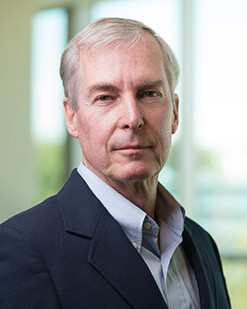Lawrence J. Wysocki, PhD

Lawrence J. Wysocki, PhD, is a researcher at National Jewish Health. Dr. Wysocki is in the Department of Immunology and Genomic Medicine.
Special Interests
Research Interests
A major goal of my research program is to elucidate the cellular and molecular events that lead to antibody formation and the development of B cell memory in immunity and autoimmunity. Somatic hypermutation is a critical but poorly defined process that plays an important role in generating such memory cells. It generates sequence alterations within antibody variable (V) genes, and thus receptor antibody molecules, that are expressed by B lymphocytes while they respond to foreign antigen. Under physiological circumstances, selection pressures normally favor the continued participation and division of rare B cell clones expressing mutant antibodies that bind antigen with improved affinity but without reactivity towards self. In this way, the memory B cell compartment is normally established.
Although it plays a decisive role in physiological acquired immunity, somatic hypermutation is a potentially dangerous process that can create autoreactive antibodies. My laboratory is investigating how T helper cells respond to recently-mutated antibody V regions, which are essentially "foreign" with respect to the available T cell repertoire. This is an important problem, because B cells can process and present their own antibody V regions to helper T cells in the context of class II MHC. Receptor presentation of this sort could provide a deviant avenue of T cell help to autoreactive B cells.
Thus far, our studies indicate that T cells are tolerant with respect to germline-encoded (nonmutated) antibody V region peptides. However, the T cell repertoire does include cells that are reactive against antibody V region peptides containing somatic mutations. Our most recent findings support the idea that T cell reactions against such mutated V region peptides may play a key role in the recruitment and chronic activation of autoreactive B cells in systemic autoimmune disease. We are currently testing this "receptor presentation" idea with specialized transgenic and gene-targeted mice.
Education
Education
- 1981
- Harvard University, PhD
- 1975
- University of California at Irvine, BS
Publications
Snyder CM, K Aviszus, RA Heiser, DR Tonkin, AM Guth and LJ Wysocki, (2004): Activation and tolerance in CD4+ T cells reactive to an immunoglobulin variable region. J Exp Med 200:1-11.
Shapiro GS, MC Ellison and LJ Wysocki. (2003): Sequence-specific targeting of two bases on both DNA strands by the somatic hypermutation mechanism. Mol Immunol 40:287-95.
Guth AM, X Zhang, D Smith, T Detanico and LJ Wysocki (2003): Chromatin specificity of anti-double-stranded DNA antibodies and a role for arginine residues in the third complementarity-determining region of the heavy chain. J Immunol 171:6260-6.
Benschop RJ, Aviszus K, Zhang X, Manser T, Cambier JC and Wysocki LJ (2001): Activation and anergy in a bone marrow B cells of a novel immunoglobulin transgenic mouse that is both hapten-specific and autoreactive. Immunity 14:33-43.
Zhang X, Smith DS and Guth A and Wysocki LJ (2001): A receptor presentation hypothesis for T cell help that recruits autoreactive B cells. J. Immunol. 166:1562-1571.
Academic Affiliations
Adjunct appointment as Professor in the Department of Immunology & Microbiology, University of Colorado Denver
